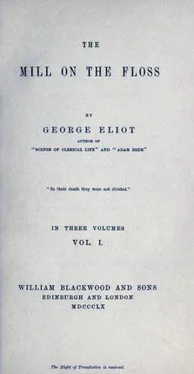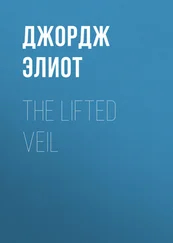It was the opening of the door, and he could hardly have dozen more than a few moments, for there was no perceptible change in the evening light. It was his father who entered; and when Philip moved to vacate the chair for him, he said,–
"Sit still. I'd rather walk about."
He stalked up and down the room once or twice, and then, standing opposite Philip with his hands thrust in his side pockets, he said, as if continuing a conversation that had not been broken off,–
"But this girl seems to have been fond of you, Phil, else she wouldn't have met you in that way."
Philip's heart was beating rapidly, and a transient flush passed over his face like a gleam. It was not quite easy to speak at once.
"She liked me at King's Lorton, when she was a little girl, because I used to sit with her brother a great deal when he had hurt his foot. She had kept that in her memory, and thought of me as a friend of a long while ago. She didn't think of me as a lover when she met me."
"Well, but you made love to her at last. What did she say then?" said Wakem, walking about again.
"She said she did love me then."
"Confound it, then; what else do you want? Is she a jilt?"
"She was very young then," said Philip, hesitatingly. "I'm afraid she hardly knew what she felt. I'm afraid our long separation, and the idea that events must always divide us, may have made a difference."
"But she's in the town. I've seen her at church. Haven't you spoken to her since you came back?"
"Yes, at Mr. Deane's. But I couldn't renew my proposals to her on several grounds. One obstacle would be removed if you would give your consent, — if you would be willing to think of her as a daughter-in-law."
Wakem was silent a little while, pausing before Maggie's picture.
"She's not the sort of woman your mother was, though, Phil," he said, at last. "I saw her at church, — she's handsomer than this, — deuced fine eyes and fine figure, I saw; but rather dangerous and unmanageable, eh?"
"She's very tender and affectionate, and so simple, — without the airs and petty contrivances other women have."
"Ah?" said Wakem. Then looking round at his son, "But your mother looked gentler; she had that brown wavy hair and gray eyes, like yours. You can't remember her very well. It was a thousand pities I'd no likeness of her."
"Then, shouldn't you be glad for me to have the same sort of happiness, father, to sweeten my life for me? There can never be another tie so strong to you as that which began eight-and-twenty years ago, when you married my mother, and you have been tightening it ever since."
"Ah, Phil, you're the only fellow that knows the best of me," said Wakem, giving his hand to his son. "We must keep together if we can. And now, what am I to do? You must come downstairs and tell me. Am I to go and call on this dark-eyed damsel?"
The barrier once thrown down in this way, Philip could talk freely to his father of their entire relation with the Tullivers, — of the desire to get the mill and land back into the family, and of its transfer to Guest & Co. as an intermediate step. He could venture now to be persuasive and urgent, and his father yielded with more readiness than he had calculated on.
"I don't care about the mill," he said at last, with a sort of angry compliance. "I've had an infernal deal of bother lately about the mill. Let them pay me for my improvements, that's all. But there's one thing you needn't ask me. I shall have no direct transactions with young Tulliver. If you like to swallow him for his sister's sake, you may; but I've no sauce that will make him go down."
I leave you to imagine the agreeable feelings with which Philip went to Mr. Deane the next day, to say that Mr. Wakem was ready to open the negotiations, and Lucy's pretty triumph as she appealed to her father whether she had not proved her great business abilities. Mr. Deane was rather puzzled, and suspected that there had been something "going on" among the young people to which he wanted a clew. But to men of Mr. Deane's stamp, what goes on among the young people is as extraneous to the real business of life as what goes on among the birds and butterflies, until it can be shown to have a malign bearing on monetary affairs. And in this case the bearing appeared to be entirely propitious.
Chapter IX. Charity in Full-Dress
The culmination of Maggie's career as an admired member of society in St. Ogg's was certainly the day of the bazaar, when her simple noble beauty, clad in a white muslin of some soft-floating kind, which I suspect must have come from the stores of aunt Pullet's wardrobe, appeared with marked distinction among the more adorned and conventional women around her. We perhaps never detect how much of our social demeanor is made up of artificial airs until we see a person who is at once beautiful and simple; without the beauty, we are apt to call simplicity awkwardness. The Miss Guests were much too well-bred to have any of the grimaces and affected tones that belong to pretentious vulgarity; but their stall being next to the one where Maggie sat, it seemed newly obvious to-day that Miss Guest held her chin too high, and that Miss Laura spoke and moved continually with a view to effect.
All well-dressed St. Ogg's and its neighborhood were there; and it would have been worth while to come even from a distance, to see the fine old hall, with its open roof and carved oaken rafters, and great oaken folding-doors, and light shed down from a height on the many-colored show beneath; a very quaint place, with broad faded stripes painted on the walls, and here and there a show of heraldic animals of a bristly, long-snouted character, the cherished emblems of a noble family once the seigniors of this now civic hall. A grand arch, cut in the upper wall at one end, surmounted an oaken orchestra, with an open room behind it, where hothouse plants and stalls for refreshments were disposed; an agreeable resort for gentlemen disposed to loiter, and yet to exchange the occasional crush down below for a more commodious point of view. In fact, the perfect fitness of this ancient building for an admirable modern purpose, that made charity truly elegant, and led through vanity up to the supply of a deficit, was so striking that hardly a person entered the room without exchanging the remark more than once. Near the great arch over the orchestra was the stone oriel with painted glass, which was one of the venerable inconsistencies of the old hall; and it was close by this that Lucy had her stall, for the convenience of certain large plain articles which she had taken charge of for Mrs. Kenn. Maggie had begged to sit at the open end of the stall, and to have the sale of these articles rather than of bead-mats and other elaborate products of which she had but a dim understanding. But it soon appeared that the gentlemen's dressing-gowns, which were among her commodities, were objects of such general attention and inquiry, and excited so troublesome a curiosity as to their lining and comparative merits, together with a determination to test them by trying on, as to make her post a very conspicuous one. The ladies who had commodities of their own to sell, and did not want dressing-gowns, saw at once the frivolity and bad taste of this masculine preference for goods which any tailor could furnish; and it is possible that the emphatic notice of various kinds which was drawn toward Miss Tulliver on this public occasion, threw a very strong and unmistakable light on her subsequent conduct in many minds then present. Not that anger, on account of spurned beauty can dwell in the celestial breasts of charitable ladies, but rather that the errors of persons who have once been much admired necessarily take a deeper tinge from the mere force of contrast; and also, that to-day Maggie's conspicuous position, for the first time, made evident certain characteristics which were subsequently felt to have an explanatory bearing. There was something rather bold in Miss Tulliver's direct gaze, and something undefinably coarse in the style of her beauty, which placed her, in the opinion of all feminine judges, far below her cousin Miss Deane; for the ladies of St. Ogg's had now completely ceded to Lucy their hypothetic claims on the admiration of Mr. Stephen Guest.
Читать дальше












